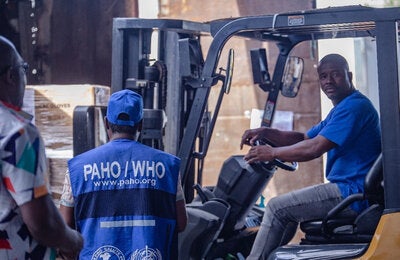
PAHO/WHO Representative Suriname Dr. Lilian Reneau-Vernon & Minister of Health Dr. Amar Ramadhin during the signing
Suriname, May 15, 2023 (PAHO/WHO) – The Pan American Health Organization (PAHO)/WHO) and the Ministry of Health of Suriname are pleased to announce the formal signing of the Country Cooperation Strategy (CCS) for Suriname 2023-2025. This event signifies the commitment of both organizations to collaborate closely in advancing the health and well-being of the Surinamese population.
The CCS serves as a comprehensive roadmap that outlines the strategic priorities, focus areas, and objectives for PAHO/WHO's technical cooperation with Suriname. It represents the culmination of a participatory process that involved extensive consultations with key stakeholders at the national and community levels, ensuring inclusivity and country ownership in the strategy's development. By identifying key health priorities and outlining strategic objectives, PAHO/WHO in Suriname seeks to address together with the Ministry of Health and other partners existing challenges and seize opportunities to foster sustainable development in the health sector.
In accordance with our mandate, PAHO/WHO engages in close collaboration with the Republic of Suriname through the development of jointly agreed Biennial Work Plans (BWP) and budgets. These instruments serve as essential accountability mechanisms and form the basis for PAHO/WHO's financial and human resource mobilization efforts. The 2023-2025 CCS for Suriname guides the formulation of the bilateral BWP and associated budgets, aligning with the country's national health priorities as outlined in the Ministry of Health's Policy Plan 2021-2025, National Health Reform Plan 2025, and the Government's Multi-Year Development Plan 2022-2026.
The CCS is also designed to be consistent with the PAHO Strategic Plan 2020-2025 and the health-related Sustainable Development Goals (SDGs), aiming to ensure equitable access to quality healthcare for all.
The signing marked a significant milestone in strengthening the partnership between PAHO/WHO and the Ministry of Health of Suriname. High-level representatives from both organizations were present to commemorate this occasion and reaffirm their commitment to working together toward achieving the health goals set forth in the CCS.
Minister of Health Dr. Amar Ramadhin expressed his gratitude and noted the following:
The signing of the CCS with PAHO/WHO is an important milestone for Suriname, as we have been able to improve the existing cooperation with PAHO/WHO well since we took office in 2020. In order to roll out specific health care policies, with the PAHO/WHO as a strategic partner of the Ministry, areas of priorities have established in this document for the coming period. This is especially important in order to know the focus areas regarding our National Recovery Plan and in the new post COVID-19 era.
During the signing, PAHO/WHO officially handed over the CCS document to the Ministry of Health, symbolizing the joint responsibility for its implementation. The document integrates the joint vision and collaborative efforts to address the health challenges faced by Suriname, aligning with the national health priorities and the Ministry of Health's strategic plans.
The PAHO/WHO Representative Suriname Dr. Lilian Reneau-Vernon acknowledged with gratitude the invaluable support and contributions of all the persons, organizations and agencies which participated in the development of the CCS 2023-2025 for Suriname. The time taken to participate in the stakeholders’ consultations as well as the knowledge and experiences shared, is highly appreciated.
The CCS for Suriname outlines four strategic priorities and fourteen corresponding focus areas, all of which contribute to the desired outcomes, and its success hinges upon active collaboration among PAHO/WHO, the Ministry of Health, and other relevant stakeholders. A multisectoral approach is encouraged, promoting coordination with sectors such as education, the environment, and agriculture to address the social determinants of health. This collaboration extends to United Nations agencies and development partners, fostering synergies to advance universal health coverage and sustainable development in the health sector.




